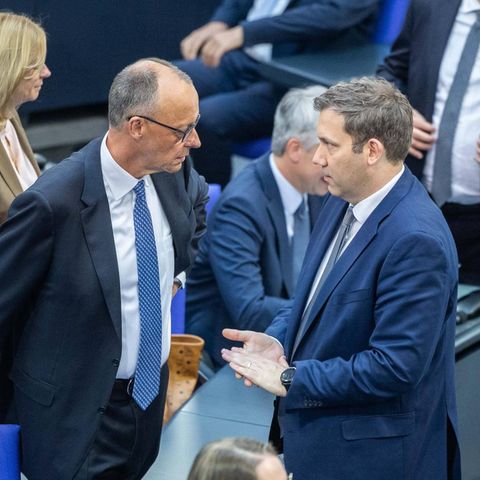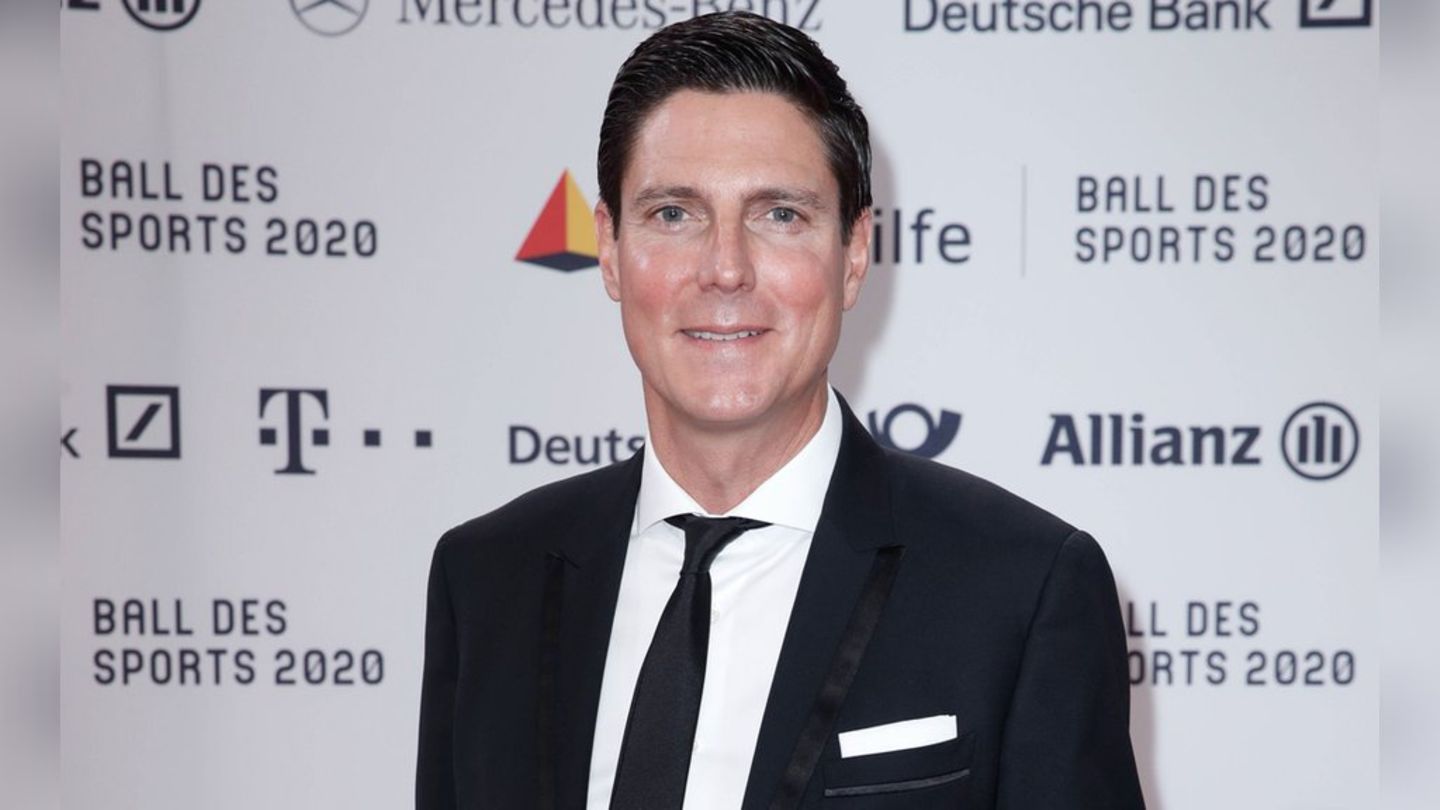SPD parliamentary group leader Miersch
Will he contradict Klingbeil?
Copy the current link
Add to the memorial list
The new SPD parliamentary group leader Matthias Miersch starts with a mortgage: his election result also shows the resistance to the march of party leader Klingbeil.
Matthias Miersch seems to be nervous. He has slightly shaky hands when he stands in the SPD faction hall on Wednesday morning and pushes an envelope into the inside pocket of his jacket. Miersch has plans, and soon clarifies whether they are going up or thwarted.
The 56-year-old wants to become a SPD parliamentary group leader, an influential position, an office with which he has been flirting for a long time. But above all, he would like to go to the concert by Roland Kaiser in Berlin next week. If it allows the appointment situation, the new Minister of Labor Bärbel Bas, who is supposed to accompany him, limit it. Both are glowing fans of the pop star, by the way a social democrat, and want to enjoy hits together next week like “Why didn’t you say no” in the arena. Therefore, he guards the envelope like a treasure: the concert tickets are in there.
At least the election as chairman of the parliamentary group, 83.2 percent of the SPD MPs say “yes” and choose Miersch as her new chairman. It is not an outstanding result. Rather one of the variety that gives you thinking – or should give him thinking: About himself. And about his relationship with the boss.
This is rare in the SPD
Miersch does not show that when he later speaks a few words in the cameras on the banks of the Spree in front of the Reichstag. You have to be enthusiastic to get big deeds, he says with enthusiasm on his face. “We want to make the social democratic manuscript very clearly recognizable” and implement the promises in the SPD coalition agreement, he announces.
His party and faction should expect that.
Lars Klingbeil, his predecessor, had recently received an “honest” result (85.6 percent) from the 120 MP -shrunk faction, as Klingbeil himself emphasized after the election. The party leader had taken on the evening of the historical election defeat according to the parliamentary group leader in order to concentrate as much negotiation power as possible in the coalition talks. Ripped off, but effective. Now Klingbeil is the new Vice Chancellor and Finance Minister. He tailored the SPD and occupied other central items with confidants and loyalists. And Matthias Miersch is the most important among them.
He has apparently felt the troubled resentment about the negotiated personnel table-which he was responsible for as SPD general secretary and Klingbeil confidant. Many well -known and experienced comrades went away empty -handed when it comes to the post. Hubertus Heil, the former Minister of Labor, were also said to have ambitions to the parliamentary group leader. However, from the game on the grounds that he lacked the support of the party leadership.
Miersch’s support in the faction is at least expandable. The result should also be the signal that it should be over with the sole approaches that comrades want to be taken with. Miersch starts office with a mortgage. He kicks in big footsteps anyway. He will be measured by his understanding of office, i.e. whether he encourages MPs to independence and self -confidence.
Matthias Miersch has often given the priority of the majority ability of his position when it comes to speaking. The 56-year-old is an experienced parliamentarian and very familiar with the processes in the Bundestag. He has been a member of the parliament since 2005 and has won his mandate in the Hanover-Land II constituency every time-for the sixth time in the last federal election. Against the national trend. This now has rarity in the SPD, which was trimmed to 16.4 percent in the Bundestag election.
Matthias Miersch and the “Merz-Cdu”
The former head of the SPD link in the Bundestag had created himself as a specialist politician (environment, climate, energy) with SPD ministers such as Sigmar Gabriel, but also recommended for higher tasks. Again and again he was acted for the parliamentary group leader until he surprisingly followed the sick Kevin Kühnert in October as a provisional general secretary. “This Merz-CDU embodies pretty much everything for which I don’t stand,” Miersch announced when he took office in the Willy-Brandt-Haus. Now he is becoming office with Jens Spahn, whom the Union faction has chosen with 91.3 percent, who have to organize black and red majorities. As you know since the chancellor’s election, this can be a tricky task.
While Friedrich Merz has to Babbern that his ambitious and likely stubborn parliamentary group leader Spahn makes it difficult for him to find his chancellor, Klingbeil with Miersch probably has no fear of anything. They are considered close confidants. And that may be the problem; The balancing act that Miersch has to master.
If Miersch wants to be measured by his popular and influential officials, he will not be able to avoid giving the SPD parliamentary group his own voice in everyday government life-and contradicting the government, including his confidante and vice-chancellor Klingbeil. To criticize government policy and, if in doubt, to correct.
Peter Struck, the seven and a half years of the SPD parliamentary board, once shaped the legendary sentence: No law left the Bundestag as it came in. The “Struck law”, still a winged word in Berlin’s political business, had actually only slipped out of the last Lower Saxony in this office (excluding Klingbeil). However, the predatory and popular leader of the parliamentary group formulated the power and claim of power of the parliament, not least the SPD parliamentary group as an independent force.
Miersch also wants to act according to the “Struck law”, he says on the banks of the Spree, but also harmoniously work with the new government. Does both go at the same time? The SPD veteran Franz Müntefering, once a parliamentary group leader, paid tribute to the Struck, who died in 2012 for his clear edge when asked. It was Peter Struck’s ability “that he did not avoid the dispute in the matter if he seemed necessary”.
Müntefering wanted this to be understood with a view to the other factions and their chairpersons, but even with the black and red federal government, there should be no dispute. Miersch speaks a potential point of conflict in front of the Reichstag: the debt brake reform that Union and SPD have appointed in the coalition agreement.
Miersch will insist on it, he takes it very precisely. After all, the lawyer has, and the corresponding passage in the black and red contract is quite clear. Miersch also knows that a two-thirds majority in the Bundestag will be necessary for the reform, so black-red will also be dependent on the voices of the Greens and Leftists. Does the Union participate? Miersch assures that the SPD faction will “do everything possible” that the reform will come. He will have to be measured by that.
It also has to be shown whether it will work with the Roland Kaiser concert next week. The new Chancellor Merz apparently wants to submit his first government declaration in the Bundestag on this day. Another balancing act for Miersch.
Source: Stern
I have been working in the news industry for over 6 years, first as a reporter and now as an editor. I have covered politics extensively, and my work has appeared in major newspapers and online news outlets around the world. In addition to my writing, I also contribute regularly to 24 Hours World.





